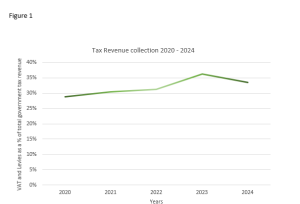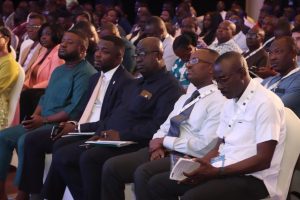
By Seth KRAMPAH, Algiers, Algeria
In a riveting fireside chat at the ongoing Intra-African Trade Fair (IATF2025),Olusegun Obasanjo, Chair of the IATF Advisory Council and former President of the Federal Republic of Nigeria has called on African nations to reclaim their economic destiny.
Speaking with CNBC Africa’s Fifi Peters on “Gaining Insights from Vision for Africa’s Future,” Obasanjo challenged conventional global financial structures and urged African leaders to embrace homegrown solutions.
The former Nigerian President did not mince words as he criticized the historical and contemporary systems that have stifled Africa’s progress. “The World Bank and IMF were not made for Africans,” he declared, adding that the legacy of slave trade and colonialism continues to cast a long shadow over the continent’s development. His remarks sparked applause from delegates, many of whom echoed his sentiments on the need for structural reform.
One of Obasanjo’s most striking positions was his rejection of the U.S. dollar as the default currency for intra-African trade. “Why should we trade in a currency that is not ours?” he asked pointedly. He however advocated for the widespread adoption of the Pan-African Payment and Settlement System (PAPSS), a platform designed to facilitate seamless cross-border transactions using local currencies.
Turning to solutions, Obasanjo emphasized the importance of self-awareness and global literacy among Africans. “We must equip ourselves with knowledge of the world and of ourselves as Africans,” he said, stressing that education and cultural pride are foundational to sustainable development. He also praised Algeria’s progressive stance in issuing 10,000 visas on arrival for IATF2025 participants and proposed a continent-wide AU Visa to ease business travel and foster deeper integration.
The former president highlighted logistics as a critical barrier to trade, proposing the establishment of an African-owned shipping line. “We can increase intra-African trade by at least 10% if we control our own shipping,” he noted, pointing to the inefficiencies and costs associated with relying on foreign carriers. His proposal aligns with the broader goals of the African Continental Free Trade Area (AfCFTA), which he described as “a game-changer for Africa.”
Obasanjo’s message was clear: Africa’s development must be driven by Africans. “Our development should be our responsibility,” he affirmed, urging governments, businesses, and civil society to collaborate on building resilient economies rooted in African values and innovation. His remarks resonated deeply with attendees, many of whom are actively involved in AfCFTA implementation and regional trade facilitation.
As IATF2025 continues to showcase Africa’s entrepreneurial spirit and industrial potential, Obasanjo’s visionary address serves as both a critique and a roadmap. His call for economic sovereignty, regional unity, and cultural pride may well become the rallying cry for a new era of African-led transformation.
The post IATF2025: Obasanjo charts bold path for Africa’s economic sovereignty appeared first on The Business & Financial Times.
Read Full Story















Facebook
Twitter
Pinterest
Instagram
Google+
YouTube
LinkedIn
RSS